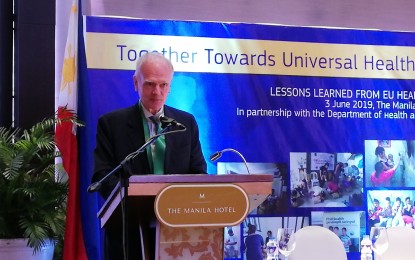
European Union Ambassador Dr. Franz Jessen says the universal health care law is a legacy law which provides Filipinos equal access to quality health care. (Photo by Ma. Teresa Montemayor)
MANILA -- The European Union (EU) on Monday expressed its continued support to the Philippines to achieving universal health care (UHC) through its partnership with the World Health Organization.
In his speech at the EU Health Programs presentation in Manila, EU Ambassador Dr. Franz Jessen said the union would continue to support the country's health sector in its aim to provide access to quality health care for Filipinos.
"This shows the very high level of trust we have between the EU and the Department of Health (DOH), and without that high level of trust, that kind of budgetary support is not possible," Jessen said.
The EU has been one of the Philippines' major development partners for more than 40 years. From 2006 to 2018, it has provided financial support to the country's health sector amounting to approximately PHP7.2 billion.
In 2006, the EU launched the Philippine and Mindanao health sector policy support program which focused on the strengthening of 29 priority provinces.
It also launched the Maternal and Child Health of Indigenous People in Mindanao Project which supported the National Council of Indigenous peoples for strengthening mother and child health care services for indigenous peoples in Mindanao.
In 2010, the EU initiated a budget support program, the Health Sector Policy Support Program and a second budget support program, the Philippine Health Sector Reform Contract, which was finalized in 2018.
"The objectives of the support programs were to contribute to the health-related millennium development goals and universal health care through improved financial capability of the government to achieve sector policy, improved health sector governance and improved quality and accessibility of health service delivery," Jessen said.
The EU evaluated the results of the two budget support programs for health from April to May 2019.
"The feedback from both parties is that both programs largely achieved its objectives and attained success stories, more than these achievements today, I know that EU supports the country through the development of the universal health care law," Jessen said.
He added the positive results would have not been possible "without its excellent partnership with the Department of Health, the Philippine Health Insurance Corporation (PhilHealth) and the Department of Foreign Affairs".
According to the EU's reports, both programs help the DOH achieve its priorities which include increase of population covered by the PhilHealth from 62 percent in 2010 to 92 percent in 2018; establishment of recovery of out-patient drug recovery clinics offering evidence-based drug abuse medical treatment in a voluntary and confidential setting that preserves human dignity; strengthening management and financing service delivery networks; and improving sexual and reproductive health care services as measured through facility-based deliveries, increased steadily from 44 percent in 2008 to 92 percent in 2018; deliveries attended by a skilled birth attendant, increased from 22.2 percent in 2008 to 94.1 percent in 2018; and modern contraceptive prevalence rate increased from 33.9 percent in 2008 to 56.7 percent in 2018.
Jessen said the EU would also continue to support the country's fight against HIV-AIDS, tuberculosis and malaria and to provide health and basic services in Mindanao.
He also lauded the Philippines for the approval of the UHC law which he called a "legacy law".
"The universal health care law, in our view represent crucial steps towards improving access to quality health care to all Filipinos particularly the poor and the vulnerable and the more disadvantaged," he said.
"I would like to thank the DOH Secretary (Francisco Duque III) for his commitment, his leadership and for taking the institutional responsibility for all the support programs," he added. (PNA)
